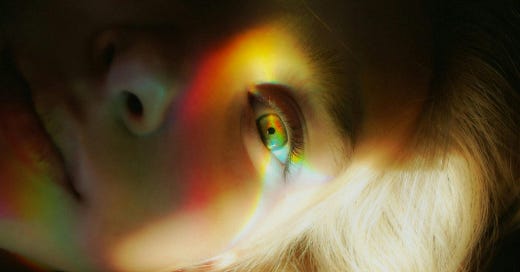Fantasy Feels Good But Distorts Love
How A Habit of Fantasising Is Harming Your Ability to Hold and Sustain Love
It feels good to think about how someone might one day choose you, how they could love you, or how things might finally make sense.
Couple this with the fact that our brain responds similarly to what is imagined and what is real and our fantasies can become potent spaces for generating pleasant feelings.
As a teenager, I’d spend hours lost in daydream as a form of escape.
In fantasy, I could be loved the way I didn’t love myself.
But as is the case with all adaptive strategies we learn as kids, they become maladaptive in adulthood.
I wanted to talk about how fantasising love can cause us problems.
Whether we fantasise excessively as a teenager or kid or find ourselves lost in fantasy today, it will impact our view of love and our ability to hold it.
Here are 3 ways fantasy can impact our view of love:
1. Idealistic Love
When you fantasise about love you run the risk of embedding an unrealistic and idealistic view of what love should be.
In fantasy, you’ll unlikely fantasise about love where strife, challenge, or pain is present — especially if you’re using fantasy to escape discomfort in your reality. Why would you imagine someone rejecting you? That would defeat the purpose of a pleasant daydream.
In my version of love, someone would choose me and everything would make sense.
The rights would be made wrong, and my pain would go away.
No longer would I need to live on desire, my fantasies painted an end to it.
As an adult, for a time, I ran off this unrealistic expectation of love and was sorely disappointed when I still had problems and when love brought challenges.
Ironically, love has brought me more problems than peace in my life so far.
Love will challenge you, it will ask you to be and do better.
Fantasy gives us rose-colored glasses, but love contains a spectrum of feelings. Take the glasses off.
2. Fantasy Can Paint Love As Your Saviour
Love won’t save you. It won’t solve your traumas. It won’t make you like yourself, or turn your cloudy days into eternal sunshine.
When we fantasise about love to escape ourselves, we’ll expect the same in reality.
We’ll be more than ready to lose ourselves and self-abandon for love.
On one hand, this can trap us in relationships with ‘almost people”. If we are reliant on someone else to make us feel good, we’ll be tied to their approval and existentially afraid of their rejection.
This is addictive and like a game of gambling, and is something I’ve spoken about before.
On the other hand, in healthier relationships, we can place too much responsibility on our partners to make us feel good. Love is a meeting of individuals with their own independent lives coming together and harmonising.
No one else can be your world or tend to all your needs, and it’s unfair to expect that they do.
3. Fantasy Attunes You With Desire
Sometimes questions can be more enticing than the answers.
With questions come possibilities, options, idealistic scenarios, and importantly, certainty.
Sometimes I think I struggle to settle down because of my attachment to desire. I’m used to being the one who fantasises and holds out hope for love, rather than the one who actually has it in front of them.
This is also why I think people get stuck in unavailable dynamics, because in these dynamics we can stay attached to fantasy and desire.
You don’t need to wonder if someone will choose you when they already have, but if you’re used to this way of relating to love — as something beyond yourself, unattainable, and only accessed in fantasy, there’s something to be said about how we might sabotage secure relationships to go back to this state of longing and hope.
We know that the brain changes as we fall in love.
When the honeymoon phase ends, our partners no longer spike our dopamine and serotonin levels like they did at the start.
Things get calmer, and the thrill of it all dies down.
I’d argue that a habit of fantasising can keep us stuck in a state of hopefulness — a state that can’t be maintained when you’re with someone who truly loves you, because when you know someone loves you, you no longer have to hope.
You have to accept.




